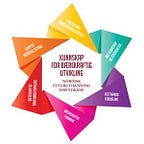Action Learning and Sustainability — Folk
High School for the Future
Can we make young adults engage in sustainability
and experience themselves as part of the solution? Inger Olin Oppedal (No)
Inger Olin Oppedal: ingerolin@gmail.com
Fana Folkehøgskule, Bergen
Summary
This project has been carried out at the folk high school Fana folkehøgskule, located in Bergen, Norway. The school has capacity for approximately 100 students and has currently 20 employees.
The students live on the school grounds. In August 2015 the school joined the project “Action research and sustainability — folk high school for the future”, a collaboration between the Norwegian association “Framtiden i våre hender” (FIOH) and the Folk High School Association (Folkehøgskolerådet, FHSR). Professor Tom Tiller, UiT (University of Tromsø), takes part as scientifically responsible with regard to pedagogy and learning.
Three equally important goals were set for the project upon start-up:
1. Sustainability shall be an integrated part of the teaching and activities, in all Norwegian folk high schools.
2. Environment friendly operations and housekeeping at the folk high schools shall be strengthened and developed.
3. The project shall develop knowledge about what pedagogical processes promote engagement and learning for sustainability, with particular focus on action learning and action research.
As part of the school’s project group the author has worked towards to all three goals, but the focus of the present report is on Items 1 and 3. Experiences, activities, results, and challenges are summarized, related to promoting sustainability through a 11⁄2-year period.
More than 10 % of Norwegian youth choose a year at a folk high school after regular high school, and the number is growing.
High engagement in sustainability among such a large proportion of our coming generation could have great impact on politics and on the future attitudes and behaviour of our population in general.
The goal of the joint project between folk high schools (hereinafter the «cooperation project»), and also of the work reported here, is to make these youth ambassadors for a more sustainable future.
As psychology teacher at the school, the author has tried to show how knowledge in psychology can be used in the work for a sustainable development. Positive social relations and good psychological health are natural parts of the subject, but other factors relevant to sustainable living have also been illuminated. Psychologists study how people think, feel, and act — alone and in relation to others.
The challenges related to sustainability have their roots in human behaviour. An understanding of why individuals and society act like they do, and how behaviour can be changed, is therefore vital in order to achieve more sustainable development.
(Contact Inger Olin Oppedal for the whole report.)
